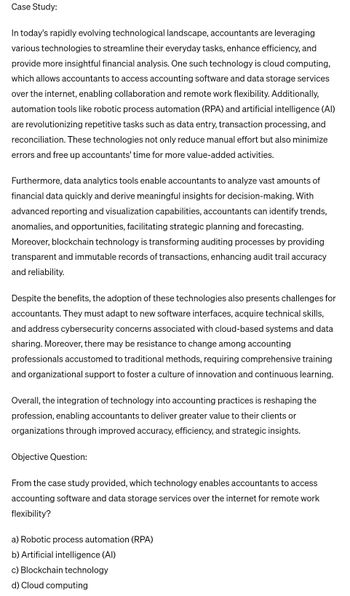
FINANCIAL ACCOUNTING
10th Edition
ISBN: 9781259964947
Author: Libby
Publisher: MCG
expand_more
expand_more
format_list_bulleted
Question

Transcribed Image Text:Case Study:
In today's rapidly evolving technological landscape, accountants are leveraging
various technologies to streamline their everyday tasks, enhance efficiency, and
provide more insightful financial analysis. One such technology is cloud computing,
which allows accountants to access accounting software and data storage services
over the internet, enabling collaboration and remote work flexibility. Additionally,
automation tools like robotic process automation (RPA) and artificial intelligence (AI)
are revolutionizing repetitive tasks such as data entry, transaction processing, and
reconciliation. These technologies not only reduce manual effort but also minimize
errors and free up accountants' time for more value-added activities.
Furthermore, data analytics tools enable accountants to analyze vast amounts of
financial data quickly and derive meaningful insights for decision-making. With
advanced reporting and visualization capabilities, accountants can identify trends,
anomalies, and opportunities, facilitating strategic planning and forecasting.
Moreover, blockchain technology is transforming auditing processes by providing
transparent and immutable records of transactions, enhancing audit trail accuracy
and reliability.
Despite the benefits, the adoption of these technologies also presents challenges for
accountants. They must adapt to new software interfaces, acquire technical skills,
and address cybersecurity concerns associated with cloud-based systems and data
sharing. Moreover, there may be resistance to change among accounting
professionals accustomed to traditional methods, requiring comprehensive training
and organizational support to foster a culture of innovation and continuous learning.
Overall, the integration of technology into accounting practices is reshaping the
profession, enabling accountants to deliver greater value to their clients or
organizations through improved accuracy, efficiency, and strategic insights.
Objective Question:
From the case study provided, which technology enables accountants to access
accounting software and data storage services over the internet for remote work
flexibility?
a) Robotic process automation (RPA)
b) Artificial intelligence (AI)
c) Blockchain technology
d) Cloud computing
SAVE
AI-Generated Solution
info
AI-generated content may present inaccurate or offensive content that does not represent bartleby’s views.
Unlock instant AI solutions
Tap the button
to generate a solution
to generate a solution
Click the button to generate
a solution
a solution
Knowledge Booster
Similar questions
- Prompt: Accounting information systems became more and more sophisticated and eventually evolved into enterprise resource planning systems. At the same time this was happening, computers were replacing many of the repetitive tasks formerly accomplished by accountants. The accounting profession changed dramatically from one dominated by transaction recording and external financial statement preparation to one where accountants were full decision-making and decision-support team members. Has the profession kept up with these changes? Are the expectations of students entering the profession different than they were before this change? Response Parametersarrow_forwardAccountants play an important role within an organization. Without the proper tools and resources, they would not be as efficient or effective in their jobs. Discuss the value that an AIS system brings to an organization. In what ways do accounting information systems enable companies to not only become more productive but also provide the ability to compete with others on a global scale?\\nProvide 2-3 ways in which you have experienced the value of AIS from a professional or personal level.arrow_forwardi. Briefly inform these stakeholders of the benefits of automation on the current business processes within the organization, specifically referencing the benefits of using a spreadsheet solution and how easy it was to process data to derive the information presented in the report. ii. Give a brief analysis of the data found in the chartarrow_forward
arrow_back_ios
arrow_forward_ios
Recommended textbooks for you

 AccountingAccountingISBN:9781337272094Author:WARREN, Carl S., Reeve, James M., Duchac, Jonathan E.Publisher:Cengage Learning,
AccountingAccountingISBN:9781337272094Author:WARREN, Carl S., Reeve, James M., Duchac, Jonathan E.Publisher:Cengage Learning, Accounting Information SystemsAccountingISBN:9781337619202Author:Hall, James A.Publisher:Cengage Learning,
Accounting Information SystemsAccountingISBN:9781337619202Author:Hall, James A.Publisher:Cengage Learning, Horngren's Cost Accounting: A Managerial Emphasis...AccountingISBN:9780134475585Author:Srikant M. Datar, Madhav V. RajanPublisher:PEARSON
Horngren's Cost Accounting: A Managerial Emphasis...AccountingISBN:9780134475585Author:Srikant M. Datar, Madhav V. RajanPublisher:PEARSON Intermediate AccountingAccountingISBN:9781259722660Author:J. David Spiceland, Mark W. Nelson, Wayne M ThomasPublisher:McGraw-Hill Education
Intermediate AccountingAccountingISBN:9781259722660Author:J. David Spiceland, Mark W. Nelson, Wayne M ThomasPublisher:McGraw-Hill Education Financial and Managerial AccountingAccountingISBN:9781259726705Author:John J Wild, Ken W. Shaw, Barbara Chiappetta Fundamental Accounting PrinciplesPublisher:McGraw-Hill Education
Financial and Managerial AccountingAccountingISBN:9781259726705Author:John J Wild, Ken W. Shaw, Barbara Chiappetta Fundamental Accounting PrinciplesPublisher:McGraw-Hill Education


Accounting
Accounting
ISBN:9781337272094
Author:WARREN, Carl S., Reeve, James M., Duchac, Jonathan E.
Publisher:Cengage Learning,

Accounting Information Systems
Accounting
ISBN:9781337619202
Author:Hall, James A.
Publisher:Cengage Learning,

Horngren's Cost Accounting: A Managerial Emphasis...
Accounting
ISBN:9780134475585
Author:Srikant M. Datar, Madhav V. Rajan
Publisher:PEARSON

Intermediate Accounting
Accounting
ISBN:9781259722660
Author:J. David Spiceland, Mark W. Nelson, Wayne M Thomas
Publisher:McGraw-Hill Education

Financial and Managerial Accounting
Accounting
ISBN:9781259726705
Author:John J Wild, Ken W. Shaw, Barbara Chiappetta Fundamental Accounting Principles
Publisher:McGraw-Hill Education